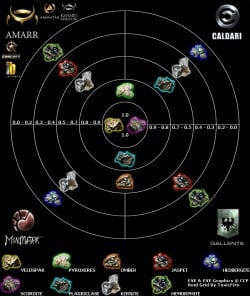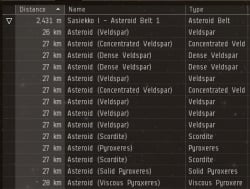No edit summary |
No edit summary |
||
| Line 50: | Line 50: | ||
| {{icon|hemorphite||Hemorphite}} Hemorphite | | {{icon|hemorphite||Hemorphite}} Hemorphite | ||
| {{icon|hedbergite||Hedbergite}} Hedbergite | | {{icon|hedbergite||Hedbergite}} Hedbergite | ||
|} | |||
=== Ores in null security space === | |||
Null security space is not as clearly defined as high security due to being player owned. Instead it is easiest to classify it by Security Class, a composite of the region and the [[System security#True security|True Sec]] of the system. | |||
The following table shows the security class letter used for null security regions: | |||
{| class="wikitable" | |||
|- | |||
! style="background:#222222;" | Class Letter !! style="background:#222222;" | Region | |||
|- | |||
| F || Detorid, Cache, Insmother, Impass, Feythabolis, Tenerifis, Omist | |||
|- | |||
| G || Stain, Esoteria, Querious, Paragon Soul, Delve, Period Basis | |||
|- | |||
| H || Vale of the Silent, Tribute, Venal, Geminate, Deklein, Tenal, Branch | |||
|- | |||
| I || Wicked Creek, Scalding Pass, Great Wildlands, Curse, Catch, Immensea, Providence | |||
|- | |||
| J || Pure Blind, Syndicate, Fade, Cloud Ring, Outer Ring, Fountain | |||
|- | |||
| K || Cobalt Edge, Perrigen Falls, Malpais, Oasa, Kalevala Expanse, Outer Passage, Etherium Reach, The Spire | |||
|} | |||
Using these, the type of ores available can be determined using the following table: | |||
{| class="wikitable" style="font-size:90%;" | |||
|- | |||
! style="background:#222222;" rowspan=2 | System<br>true<br>sec | |||
! style="background:#222222;" colspan=6 | Security Class | |||
|- | |||
! style="background:#222222;" | F | |||
! style="background:#222222;" | G | |||
! style="background:#222222;" | H | |||
! style="background:#222222;" | I | |||
! style="background:#222222;" | J | |||
! style="background:#222222;" | K | |||
|- | |||
| {{co|#F00000|█}} -0.00 to -0.249 | |||
| {{icon|veldspar|32|Veldspar}} Veldspar<br>{{icon|scordite|32|Scordite}} Scordite<br>{{icon|omber||Omber}} Omber<br>{{icon|hedbergite||Hedbergite}} Hedbergite<br>{{icon|hemorphite||Hemorphite}} Hemorphite | |||
| {{icon|veldspar|32|Veldspar}} Veldspar<br>{{icon|scordite|32|Scordite}} Scordite<br>{{icon|plagioclase||Plagioclase}} Plagioclase<br>{{icon|omber||Omber}} Omber<br>{{icon|kernite||Kernite}} Kernite | |||
| {{icon|veldspar|32|Veldspar}} Veldspar<br>{{icon|scordite|32|Scordite}} Scordite<br>{{icon|pyroxeres||Pyroxeres}} Pyroxeres<br>{{icon|jaspet||Jaspet}} Jaspet<br>{{icon|hemorphite||Hemorphite}} Hemorphite | |||
| {{icon|veldspar|32|Veldspar}} Veldspar<br>{{icon|scordite|32|Scordite}} Scordite<br>{{icon|omber||Omber}} Omber<br>{{icon|hedbergite||Hedbergite}} Hedbergite<br>{{icon|hemorphite||Hemorphite}} Hemorphite | |||
| {{icon|veldspar|32|Veldspar}} Veldspar<br>{{icon|scordite|32|Scordite}} Scordite<br>{{icon|pyroxeres||Pyroxeres}} Pyroxeres<br>{{icon|plagioclase||Plagioclase}} Plagioclase<br>{{icon|jaspet||Jaspet}} Jaspet | |||
| {{icon|veldspar|32|Veldspar}} Veldspar<br>{{icon|scordite|32|Scordite}} Scordite<br>{{icon|omber||Omber}} Omber<br>{{icon|hedbergite||Hedbergite}} Hedbergite<br>{{icon|hemorphite||Hemorphite}} Hemorphite | |||
|- | |||
| {{co|#F00000|█}} -0.25 to -0.349 | |||
| {{icon|spodumain||Spodumain}} Spodumain | |||
| {{icon|gneiss||Gneiss}} Gneiss | |||
| {{icon|hedbergite||Hedbergite}} Hedbergite | |||
| {{icon|jaspet||Jaspet}} Jaspet | |||
| {{icon|dark ochre||Dark Ochre}} Dark Ochre | |||
| {{icon|dark ochre||Dark Ochre}} Dark Ochre | |||
|- | |||
| {{co|#F00000|█}} -0.35 to -0.449 | |||
| {{icon|gneiss||Gneiss}} Gneiss | |||
| {{icon|pyroxeres||Pyroxeres}} Pyroxeres | |||
| {{icon|dark ochre||Dark Ochre}} Dark Ochre | |||
| {{icon|spodumain||Spodumain}} Spodumain | |||
| {{icon|crokite||Crokite}} Crokite | |||
| {{icon|spodumain||Spodumain}} Spodumain | |||
|- | |||
| {{co|#F00000|█}} -0.45 to -0.549 | |||
| {{icon|bistot||Bistot}} Bistot | |||
| {{icon|spodumain||Spodumain}} Spodumain | |||
| {{icon|kernite||Kernite}} Kernite | |||
| {{icon|gneiss||Gneiss}} Gneiss | |||
| {{icon|bistot||Bistot}} Bistot | |||
| {{icon|crokite||Crokite}} Crokite | |||
|- | |||
| {{co|#F00000|█}} -0.55 to -0.649 | |||
| {{icon|arkonor||Arkonor}} Arkonor | |||
| {{icon|bistot||Bistot}} Bistot | |||
| {{icon|crokite||Crokite}} Crokite | |||
| {{icon|dark ochre||Dark Ochre}} Dark Ochre | |||
| {{icon|hemorphite||Hemorphite}} Hemorphite | |||
| {{icon|bistot||Bistot}} Bistot | |||
|- | |||
| {{co|#F00000|█}} -0.65 to -0.749 | |||
| {{icon|pyroxeres||Pyroxeres}} Pyroxeres | |||
| {{icon|crokite||Crokite}} Crokite | |||
| {{icon|spodumain||Spodumain}} Spodumain | |||
| {{icon|arkonor||Arkonor}} Arkonor | |||
| {{icon|hedbergite||Hedbergite}} Hedbergite | |||
| {{icon|arkonor||Arkonor}} Arkonor | |||
|- | |||
| {{co|#F00000|█}} -0.75 to -0.849 | |||
! colspan= 7 | {{icon|mercoxit||Mercoxit}} Mercoxit | |||
|- | |- | ||
| {{co|#F00000|█}} 0. | | {{co|#F00000|█}} -0.85 to -1.00 | ||
| {{icon| | | {{icon|plagioclase||Plagioclase}} Plagioclase | ||
| {{icon|dark ochre||Dark Ochre}} Dark Ochre | | {{icon|dark ochre||Dark Ochre}} Dark Ochre | ||
| {{icon| | | {{icon|bistot||Bistot}} Bistot | ||
| | | {{icon|kernite||Kernite}} Kernite | ||
| {{icon|arkonor||Arkonor}} Arkonor | |||
| {{icon|gneiss||Gneiss}} Gneiss | |||
|} | |} | ||
* Note that, going down each column, all ores present in the class above also spawn. For instance, "J" systems spawn Veldspar, Scordite, Pyroxeres, Plagioclase, and Jaspet. "J1" systems have all of those, plus Dark Ochre. "J2" systems have everything in "J1" systems, plus Crokite, and so on. | |||
In general, the rarer the ore, the higher its volume per unit (e.g. one unit of Veldspar has a volume of 0.1 m<sup>3</sup>, whereas one unit of Arkonor has a volume of 16 m<sup>3</sup>). Since mining lasers mine a given ''volume'' of ore per minute, it takes longer to mine the rarer ore types. Additionally, each ore reprocesses into a different set of minerals. For details, see [[Reprocessing]]. | In general, the rarer the ore, the higher its volume per unit (e.g. one unit of Veldspar has a volume of 0.1 m<sup>3</sup>, whereas one unit of Arkonor has a volume of 16 m<sup>3</sup>). Since mining lasers mine a given ''volume'' of ore per minute, it takes longer to mine the rarer ore types. Additionally, each ore reprocesses into a different set of minerals. For details, see [[Reprocessing]]. | ||
Note that mining Mercoxit requires the {{sk|Deep Core Mining}} skill as well as [[ORE Basic Ship and Skill Guide#High-slot modules|special mining modules]] (Deep Core Miners or Deep Core Strip Miners). All other ore types can be mined with all types of ore mining lasers or strip miners. | Note that mining Mercoxit requires the {{sk|Deep Core Mining}} skill as well as [[ORE Basic Ship and Skill Guide#High-slot modules|special mining modules]] (Deep Core Miners or Deep Core Strip Miners). All other ore types can be mined with all types of ore mining lasers or strip miners. | ||
Latest revision as of 00:09, 20 July 2018
Asteroid distribution


- For the distribution of ice asteroids, see Ice distribution.
The EVE universe can be divided into four quarters:
- The Amarr quarter (includes systems held by the Amarr, Ammatar, Khanid, Blood Raiders, and Sansha's Nation)
- The Caldari quarter (includes systems held by the Caldari and Guristas)
- The Gallente quarter (includes systems held by the Gallente and Serpentis)
- The Minmatar quarter (includes systems held by the Minmatar and Angel Cartel)
Each of these four quarters has its own set of asteroid types. Additionally, the lower the security rating of a system, the rarer the asteroid types that can be found there. Finally, each system can also include all the asteroid types of same-quarter higher-security systems. For example, a Gallente system with a security rating of 0.7 will have asteroid belts with not only Omber asteroids, but also Veldspar, Scordite, and Plagioclase asteroids.
Ores in null security space
Null security space is not as clearly defined as high security due to being player owned. Instead it is easiest to classify it by Security Class, a composite of the region and the True Sec of the system.
The following table shows the security class letter used for null security regions:
| Class Letter | Region |
|---|---|
| F | Detorid, Cache, Insmother, Impass, Feythabolis, Tenerifis, Omist |
| G | Stain, Esoteria, Querious, Paragon Soul, Delve, Period Basis |
| H | Vale of the Silent, Tribute, Venal, Geminate, Deklein, Tenal, Branch |
| I | Wicked Creek, Scalding Pass, Great Wildlands, Curse, Catch, Immensea, Providence |
| J | Pure Blind, Syndicate, Fade, Cloud Ring, Outer Ring, Fountain |
| K | Cobalt Edge, Perrigen Falls, Malpais, Oasa, Kalevala Expanse, Outer Passage, Etherium Reach, The Spire |
Using these, the type of ores available can be determined using the following table:
- Note that, going down each column, all ores present in the class above also spawn. For instance, "J" systems spawn Veldspar, Scordite, Pyroxeres, Plagioclase, and Jaspet. "J1" systems have all of those, plus Dark Ochre. "J2" systems have everything in "J1" systems, plus Crokite, and so on.
In general, the rarer the ore, the higher its volume per unit (e.g. one unit of Veldspar has a volume of 0.1 m3, whereas one unit of Arkonor has a volume of 16 m3). Since mining lasers mine a given volume of ore per minute, it takes longer to mine the rarer ore types. Additionally, each ore reprocesses into a different set of minerals. For details, see Reprocessing.
Note that mining Mercoxit requires the Deep Core Mining skill as well as special mining modules (Deep Core Miners or Deep Core Strip Miners). All other ore types can be mined with all types of ore mining lasers or strip miners.




